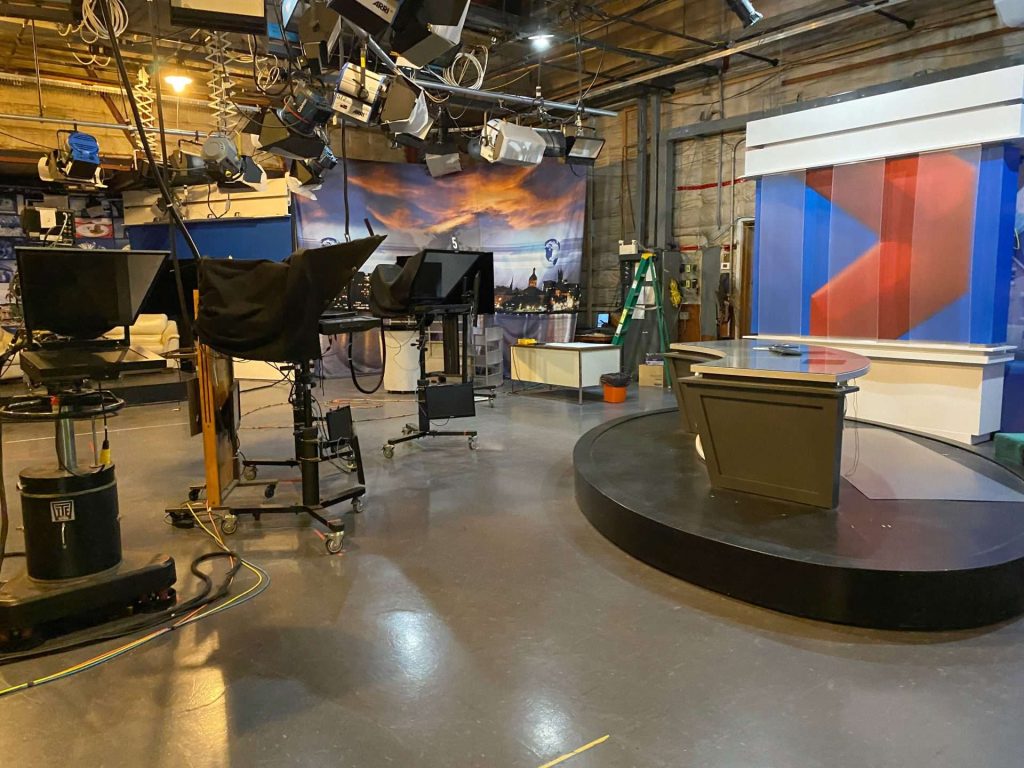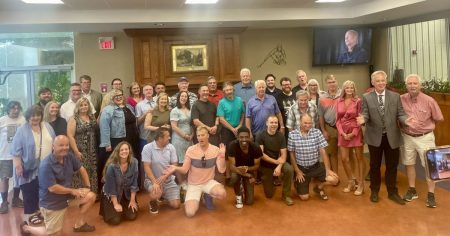A glimpse inside the sound stage at 170 Queen Street in downtown Kingston, the home of CKWS (and then Global) News for decades. Despite the warm lighting, the emptiness of the space makes the image seem chilly. Photo by Bill Hutchins/Kingstonist.
Before I was so rudely interrupted, yanked from the airwaves without warning over a month ago, this is what happened — here’s my story of what went down with layoffs and what’s ahead for the Global Kingston broadcast centre.
Monday, Jul. 15, 2024, started off like any other work week for me. I’d just come back from two weeks’ vacation and was reenergized for the days ahead. There were ongoing stories about what was to come after the LaSalle Causeway lift bridge demolition, the Wolfe Islander IV’s delayed service, summer tourism check-up, and other important news of the day to get into the show.
My workdays involved producing and presenting the evening newscast, CKWS News at 6 p.m., on Global Kingston.
Global had taken control of the CKWS TV operation some eight years prior, after Corus Entertainment, the parent company, bought Shaw Media, including the Global TV network, in a mega-merger deal worth about $2.65 billion.
While the ongoing revenue headwinds facing Corus have been well documented, the end of CKWS as a stand-alone broadcast centre came soon after Rogers Communications Inc. snatched away the Canadian rights to broadcast some lucrative specialty brands on HGTV, Discovery, and Food Network from Corus. I didn’t pay too much attention to the revenue impact of that high-level corporate content-raiding story, but it seemed to signal bad news ahead.
I didn’t know it at the time, but on Wednesday, Jul. 17, 2024, I anchored my last newscast after 27 years behind the desk, and 34 years in total with Corus.
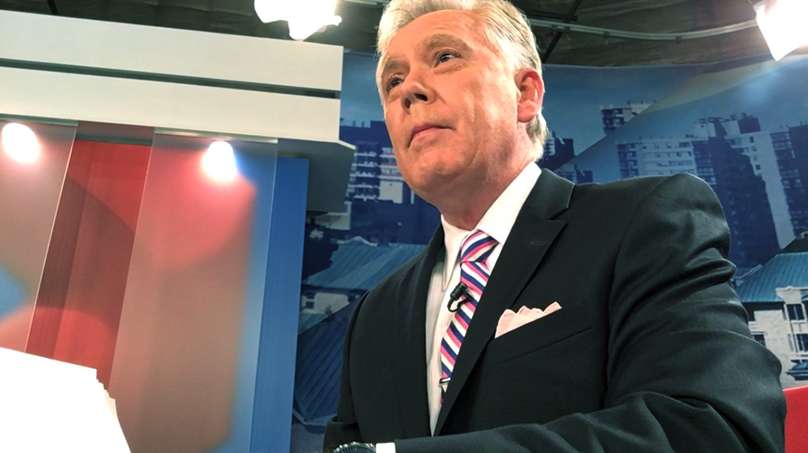 Bill Hutchins, Kingston’s longtime “anchor man,” prepares for the evening news broadcast at the CKWS/ Ontario Chronicle headquarters on Queen Street in downtown Kingston before that evening news broadcast was abruptly ended by the powers that be with Corus Entertainment. Photo by Bill Hutchins/Kingstonist.
Bill Hutchins, Kingston’s longtime “anchor man,” prepares for the evening news broadcast at the CKWS/ Ontario Chronicle headquarters on Queen Street in downtown Kingston before that evening news broadcast was abruptly ended by the powers that be with Corus Entertainment. Photo by Bill Hutchins/Kingstonist.
A few days prior, I had joined a Corus-wide conference call to hear the co-CEOs talk about the challenges they were facing, plunging stock prices, and the broad strategy to shed assets, particularly heritage assets, in an “aggressive” cost-cutting that other news outlets said would result in Corus shedding 25 per cent of its full-time jobs.
On the same day of what turned out to be the final locally produced newscast at CKWS, our staff learned that Corus HR (or what they call the People Team) was already at our sister station in CHEX Peterborough to cut jobs. The very next day, they came here, and the mass layoffs began.
The axe came down on Thursday, July 18 – a dark day for staff and a dark day for local broadcasting.
The People Team actually brought in two teams, occupying two boardrooms simultaneously, to unleash a wave of looming staff cuts. In essence, the TV station was reduced to a small news bureau and the two radio stations, BIG FM and FRESH FM, were automated.
Employees were laid off in person, over the phone, or via Zoom calls as managers worked their way down their checklist of people. In all, about two dozen union and non-union staff were let go. That’s virtually everyone in the building at 170 Queen Street.
One at a time, employees were summoned into one of the two boardrooms to hear the bad news. Each time, company managers summed up their careers in two or three sentences, before HR presented them with a layoff notice, severance, and ‘bumping’ options. Because the cuts were so vast, there were few positions left unscathed for senior staff to bump into, as is their contractual right.
It’s hard to describe how difficult that day was, and remains, for so many people who were loyal to the company to the bitter end. But loyalty doesn’t boost share prices or pay Corus’ debts. In the end, it couldn’t save their jobs.
Every single radio announcer was let go. And just about everyone on the television side, save for a handful of videographers, met the same fate. Anchors, reporters, production, operations, engineers, administrators, and even the janitor got their departure papers that day.
Some cried. Some were furious. Others were just resolved to being the latest casualties in the drastic hollowing out of Canada’s media industry.
I personally tried to warn company representatives that they were about to unleash a large-scale community outrage among viewers and listeners over what the cuts meant to their local radio and television programs. The warning went unheeded in the push to shed overhead costs.
As a legacy station in its 70th year of broadcasting, CKWS had developed an extremely loyal following over the decades. In this multi-channel, multi-platform universe where we can consume news on demand, the flagship 6 o’clock newscast remained staunch “appointment viewing” for many people. In fact, it was a mainstay for generations of families.
I don’t have exact numbers of how many people watched the evening news, but judging by the intense community reaction in the days that followed, the impact of closing the TV station and the pending sale of the iconic building at 170 Queen Street (just immortalized in the downtown BIA’s pewter holiday ornament collection last year) was devastating to viewers. They never saw it coming and never had the chance to say goodbye to the people they grew up watching.
CKWS News was comfort viewing. People wanted to know, and deserved to know, what’s going on in their community. We were proud to do many special programs over the years, as well – from political debates to Santa parades and Easter Seal telethons. CKWS and the radio stations also represented a vital connection to community groups to share their stories and fundraising ventures, and just to get the word out about issues important to them. We were their sounding board.
But in this industry, if you don’t make enough money, you’re expendable. I understand Corus has a business to run and save. But that still doesn’t diminish the lasting pain left in the wake of the Kingston media cuts.
The radio stations are now staffed by announcers doing pre-recorded ‘voice tracks’ from other cities, while CKWS has been reduced to a bureau status with its newscast produced in Toronto and anchored out of Peterborough. Apparently, having this bare-bones staff is enough for Corus to meet the requirements of the Canadian Radio-television and Telecommunications Commission (CRTC) to keep its broadcasting licenses here.
My heart goes out to all those impacted directly by the layoffs – the colleagues I have worked with for many years, and the viewers who now feel lost.
Corus has not abandoned Kingston, but it has created a big void in a city with a rapidly expanding population.
On Saturday, Aug. 17, 2024, almost one month to the day since the studio lights went out, dozens of former broadcasters gathered at the Royal Kingston Curling Club on Days Road. The final send-off reception, organized by the stations’ local Unifor union, also welcomed members of the public to bring some in-person closure to what happened, discuss the loss of local news, reminisce about the good old days, and try to make sense of what comes next.
Hundreds showed up at the reception. Former CKWS sports director and anchor Mark Potter MC’d the gathering, which included speeches from MP Mark Gerretsen, MPP Ted Hsu, and former radio and TV staffers like myself.
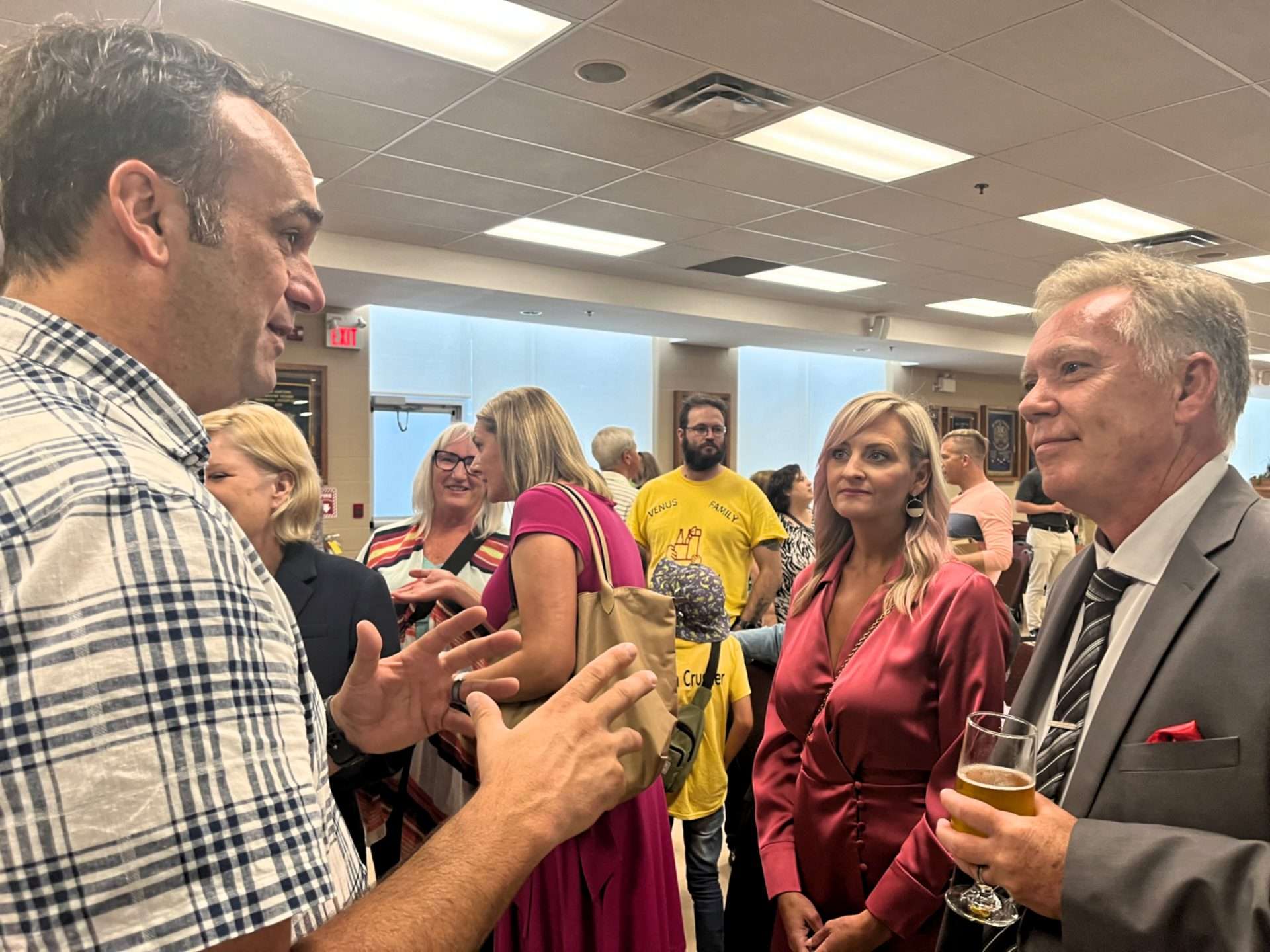 MP Mark Gerretsen (left) speaks with Bill Hutchins (right) as another former CKWS anchor/co-host, Maegan Kulchar, looks on.
MP Mark Gerretsen (left) speaks with Bill Hutchins (right) as another former CKWS anchor/co-host, Maegan Kulchar, looks on.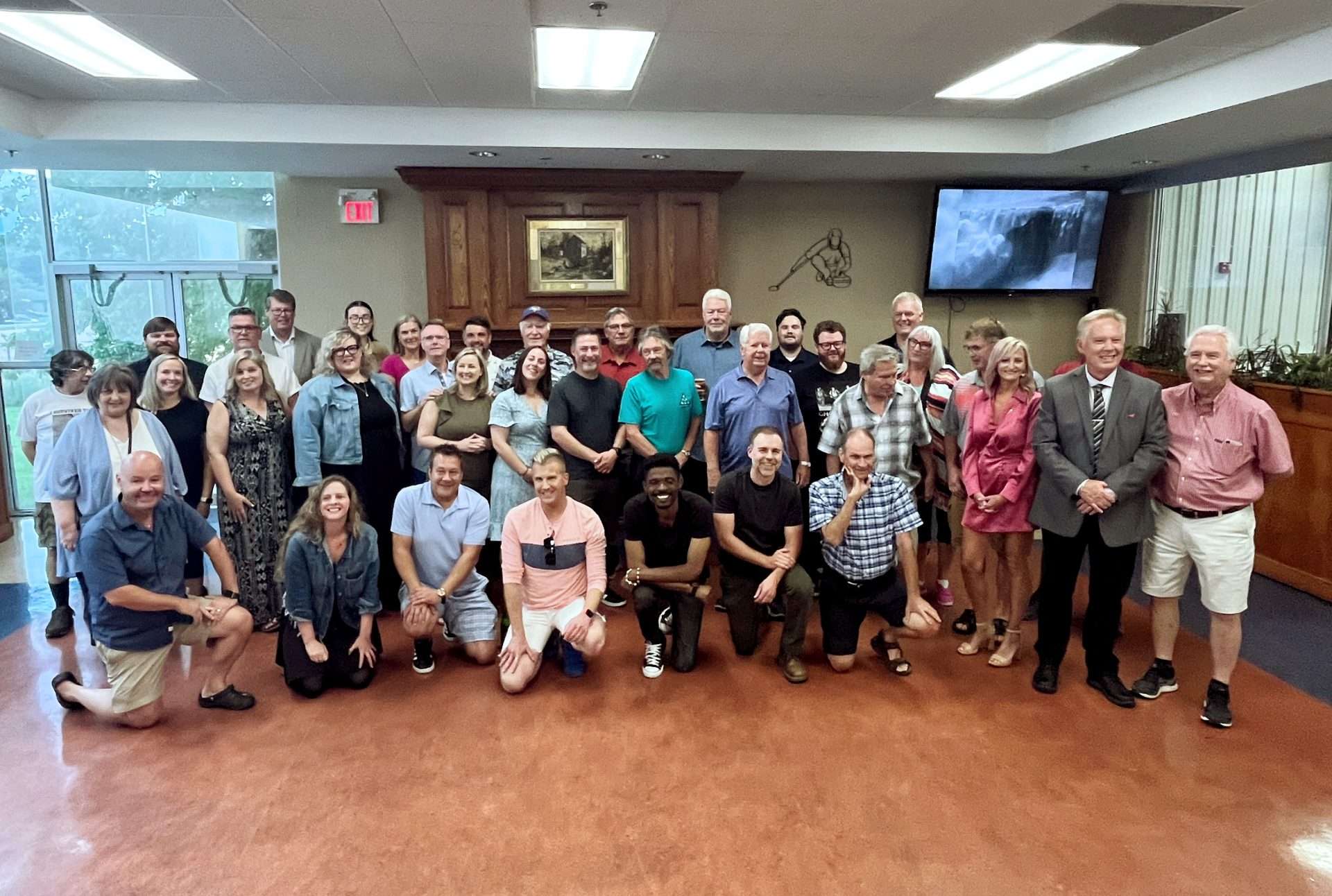 Some of the crew and personalities that made up CKWS over they years.Submitted photos from the CKWS send-off celebration on Saturday, Aug.17, 2024, at the Royal Canadian Curling Club in Kingston.
Some of the crew and personalities that made up CKWS over they years.Submitted photos from the CKWS send-off celebration on Saturday, Aug.17, 2024, at the Royal Canadian Curling Club in Kingston.
Residents in Kingston, and indeed much of southeastern Ontario, have lost their beloved TV and radio stations that were fixtures in so many households.
So, on that note, thanks for watching! It was my pleasure. And don’t forget to support what remains of local journalism in this community. Don’t take this for granted because one day, it may be gone.






